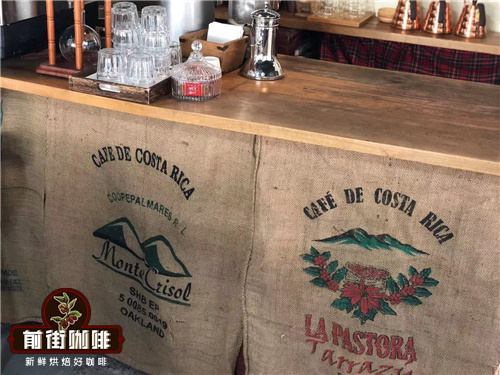What do you have in Ethiopian coffee beans? What are the varieties of coffee beans in Ethiopia?

Professional coffee knowledge exchange more coffee bean information please follow the coffee workshop (Wechat official account cafe_style)
Ethiopia: the birthplace of coffee
Ethiopia (formerly known as Abyssinia) is the birthplace of coffee.
Ancient Ethiopian history claimed that Ethiopian goat herdsman Kaldi first discovered coffee and that it had magical benefits around 850 AD. According to legend, he found his goat eating coffee fruit on a tree and dancing crazily. He was fascinated by these "magic" beans and took them home. When Kaldi showed a monk their benefits, he threw them into the fire, claiming that the magical effect was the work of the devil. Of course, the beans began to be roasted and the whole room was filled with the smell of freshly roasted coffee.
However, the first sign of brewing coffee as a drink is in another 50 years. Coffee, formerly known as Kaffa, comes from southwestern Ethiopia, where coffee was first found in the wild. Unlike almost all other coffee-growing countries, coffee trees grow naturally here.
Perfect growth conditions of coffee beans
Ethiopia is the primitive home of coffee. Coffee trees have grown in the wild for centuries. The environment in Ethiopia is very suitable for the growth of coffee, and the coffee produced here has a taste even if it is drunk without adding anything.
There are more than a thousand different varieties of coffee beans in Ethiopia. On the other hand, the high-altitude areas in the southern mountains have excellent growth conditions. The soil here is deep and the vegetation is lush.
Most coffee is grown in the shade and other plants without agrochemicals.
By contrast, farmers anywhere else in the world must grow certain types of coffee and create perfect conditions, such as planting extra trees to provide shade for small coffee trees.
Flavor characteristics of Ethiopian Coffee
Caffeine from Ethiopia is famous for its bright fruit and flower aromas.
These coffees usually have higher acidity, light to medium body and complex flavor.
The treatment of Ethiopian coffee
Coffee beans can not be roasted until they are washed or tanned. The processing method used has a great impact on the final taste of coffee.
Washing:
When the coffee is washed, the skin and pulp will be mechanically removed immediately. Coffee treated in this way is characterized by a clear flavor and a bright, complex aroma.
The sun:
Dry the naturally processed coffee with the fruit on the coffee beans. The pulp was not taken out until before the exit.
Coffee beans retain more fruit flavors, such as blueberries, and contain deep chocolate base creams and syrup bodies.
Qianjie recommended cooking parameters:
V60ap90 ℃ / 1 15 / time two minutes
Qianjie coffee: Guangzhou bakery, the store is small but a variety of beans, you can find a variety of unknown beans, but also provide online store services. Https://shop104210103.taobao.com
Important Notice :
前街咖啡 FrontStreet Coffee has moved to new addredd:
FrontStreet Coffee Address: 315,Donghua East Road,GuangZhou
Tel:020 38364473
- Prev

The characteristics and Flavor of Ethiopian Coffee beans the Origin and Story of Yegashifi and Sidamo Coffee
Professional coffee knowledge exchange more coffee bean information Please follow Coffee Workshop (official Wechat account cafe_style) Coffee birthplace Ethiopia is located in East Africa, and there are as many as 5,000 wild coffee bean varieties found in the forest in the southern Kaffa region alone. It is generally believed that Ethiopia is the source of coffee
- Next

Ethiopian coffee beans introduce Ethiopian coffee culture Ethiopian coffee
Professional coffee knowledge exchange more information about coffee beans please follow the coffee workshop (Wechat official account cafe_style) Ethiopia is one of the largest coffee producers in the world. However, its exports are less than half of its growth. In other words, it consumes more than half of its own production. For nearly 100 million people, this is about 500 million pounds of coffee, which is a special order.
Related
- Detailed explanation of Jadeite planting Land in Panamanian Jadeite Manor introduction to the grading system of Jadeite competitive bidding, Red bid, Green bid and Rose Summer
- Story of Coffee planting in Brenka region of Costa Rica Stonehenge Manor anaerobic heavy honey treatment of flavor mouth
- What's on the barrel of Blue Mountain Coffee beans?
- Can American coffee also pull flowers? How to use hot American style to pull out a good-looking pattern?
- Can you make a cold extract with coffee beans? What is the right proportion for cold-extracted coffee formula?
- Indonesian PWN Gold Mandrine Coffee Origin Features Flavor How to Chong? Mandolin coffee is American.
- A brief introduction to the flavor characteristics of Brazilian yellow bourbon coffee beans
- What is the effect of different water quality on the flavor of cold-extracted coffee? What kind of water is best for brewing coffee?
- Why do you think of Rose Summer whenever you mention Panamanian coffee?
- Introduction to the characteristics of authentic blue mountain coffee bean producing areas? What is the CIB Coffee Authority in Jamaica?

